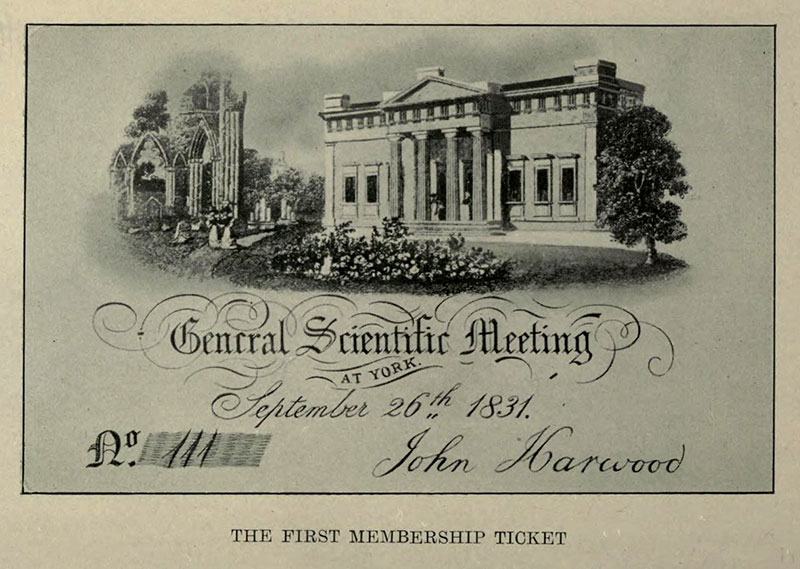
BAAS annual meetings went on for days, and tickets such as this one were highly coveted by an interested public eager to learn about modern science, especially geology. Image courtesy of Archive.Org.
The BAAS (British Association for the Advancement of Science, now called the British Science Association, or BSA) was formed in 1831. Worried that Britain lagged behind other European countries in the sciences, several prominent men formed an organization devoted entirely to scientific pursuits. Research was carried out by men of means who could afford to sponsor their own work, but it had become evident that larger structures—educational, governmental, and industrial—were needed to foster scientific development and to form a pool of professionals. Geologists were among the most active in founding the association.
From the start, public education was an important part of the BAAS's mission. The first meeting was held in York, the next in Oxford, then Cambridge, Edinburgh, and Dublin, establishing the practice of convening in different provincial cities. London was deliberately excluded from the roster to make the meetings feel truly rooted across the British Isles. The meetings were divided into “sections” for geology, medicine, statistics, mechanics, chemistry, zoology, and what is now called physics. Papers presented at the meetings were published afterward, along with an annual president’s report on the progress of scientific work over the previous year.
The Geological Section was the most popularly attended. The intellectual content was high, yet the topics were accessible to the public, often presented by the most prominent geologists of the day. Amateurs were welcome to attend the talks, demonstrations, field trips, picnics, and banquets. “What is strange,” noted a news account, “there is generally almost as many ladies as gentlemen present.” A BAAS meeting was a somewhat expensive outing, however. Aware of this, they lent support to the lower-key Mechanics’ Institutes and the Society for the Diffusion of Useful Knowledge, where members of the working class could learn about the sciences closer to home.
One of the best-known stories in the history of science occurred in a meeting of the BAAS held in Oxford in 1860, less than a year after Charles Darwin published On the Origin of Species. In an exchange between Samuel Wilberforce, the Bishop of Oxford, and Thomas Henry Huxley, a strong supporter of Darwin, Wilberforce ridiculed Huxley for believing that he was descended from an ape. According to legend, Huxley replied that he would rather have an ape for a grandfather than be descended from a man who refused to use the intellect God gave him and who had opinions in subjects about which which he knew nothing. This, of course, is not exactly what happened—the exchange did not appear in news accounts immediately afterward, and later tellings differed in the details—but the story lives on because it neatly encapsulates biblically literal opposition to arguments for human descent through evolution. Not surprisingly, both men saw themselves as having won.
The Association of American Geologists, which became the Association for the Advancement of American Science, was modeled on the BAAS.